Co-creating Smart & Sustainable Cities
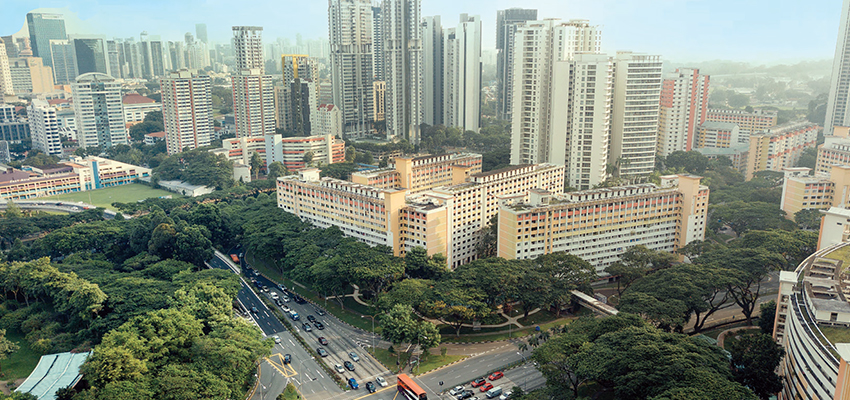
Pune city, once known as the Queen of the Deccan and a pensioner’s paradise, has transformed into an IT and automobile industries hub in the past few decades thereby leading to mushrooming of many large residential and commercial projects which has reduced the green cover causing temperatures to soar to 41 degrees Celsius in summer. City based environmentalists and activists are voicing their protests against many city development projects that are detrimental to the environment. It is imperative that the emerging concept of building smart cities should also tackle sustainability problems deriving from rapid urbanisation.
For co-creation of such smart city and following sustainability goals, a panel discussion on ‘How to make Pune Smarter—Environmental issues of Pune’ was held recently in Pune city. Former state environment minister, Maharashtra State, Aaditya Thackeray, in his keynote address spoke about the need for having sustainable development of Pune city. While Anu Aga, leading senior corporate leader and former chairperson of Thermax, reminisced about her good old days in serene Pune city and spoke about the environmental problems being faced now due to the unplanned development. Corporate Citizen brings you the excerpts of the discussion.
Perseverance for preserving
Our inclination has been student development and, personally, I have a major soft corner for the student community. They are so earnest, optimistic, brimming ht ideas. If they have the right kind of mentorship, they can do wonders
-Aaditya Thackeray,
Former state environment
minister, Maharashtra State
The first city to respond very positively to our then state government’s ban on plastic bottles and carry bags was Pune and I cannot say enough thank you to Pune for that because you are thinking so much about the environment. You are fighting with perseverance for preserving Vetal Tekdi (a city hill) and against river development project. You are demanding that the politicians must be answerable to the public, which is a necessity.
I think the only answer to how to make Pune smarter is simple, listen to Punekars. This is the real situation. When we think about environment, we are given the tag of activists, civil society, non-governmental organisation (NGO)s and in the extreme cases even called as urban naxals. Even if this is true, we are not fighting without any reason. We are giving an alternative and we are thinking about the real situation.
In my visit to Vetal tekdi, I found that it is not like, there is nothing there. The environment impact assessment (EIA) report and the consultant has said that there is nothing there. There they will be constructing two to three roads, double decker flyover, metro and a tunnel below. I told the people that instead of creating all this and to reduce the government expenditure, we will flatten the tekdi to create a circle there and treat it as a junction. So, we will recover the expenditure on it and the government will also get rid of the trouble. But this will suffice for how many years?
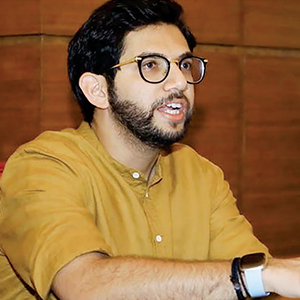
Are we thinking of next five years or one term? Only spending money or just showing expenditure on projects does not mean development. We cannot go anywhere with these short term goals. They create problems for the city in short term and also quickly. The problem is that no one thinks of the next 50 years and while thinking of next 50 years’, no one thinks about today. Now the time has come for citizens of urban and rural areas to think about what exactly we are doing, for whom and what we are achieving through it.
There is no need to fear about urbanisation. Twenty years ago also, urbanisation was a fearful word. Now we may have to think about new thing like re-urbanisation. I have started work in Mumbai municipal schools to teach children what is urban farming and urban forest. In same way in rural areas or in villages, there is need to teach what is solid and liquid waste management, sewage treatment plant(STP)s; how the road surface must be? Whether it must be concrete or asphalt road and how ducting and utilities should be there? Only constructing concrete roads and glass buildings does not mean urbanisation. We will have to demarcate the boundaries of urbanisation and decide what is urbanisation.
When we are thinking of development, we must think of what should be sustainable development. Whether we are creating this development for the locals or for the people on the Moon or those on the Mars. Whether we are doing it for next generation or for the different species—whichever that will come after us to show that you are working like the pre-historic dinosaurs.
When we are thinking about Smart Pune then five to six things are most important according to me. The first thing is transportation. I am not opposing the metro— its construction can be seen everywhere in the city. If there is need for metro, then I will strongly say that do it 100 percent. But, while constructing metro lines then one must think about, from where to where the metro lines are going, future planning, whether we will be able to change metro routes in future? During my London visit for Cop 26, I spoke to a genuine expert and not a government expert who said that metro is a 30 to 40-year-old concept. Now you will be spending Rs 40,000 to 50,000 crores on it and construct concrete infrastructure. The metro line has a specific passenger transport capacity. Its headway time is fixed. You cannot change the route when you need, nor augment its capacity.
If you want to change the route you cannot change this concrete infrastructure nor augment its capacity. So, I asked what is an alternative solution to it. He replied that making the bus network strong is its solution. We were preparing Climate Action Plan for Pune like that of Mumbai. We were preparing such plans for Solapur and Kolhapur too. We were going to have buses for every city in ratio to its population. These would be electric and hydrogen buses. I think it is necessary to strengthen Pune Mahanagar Parivahan Mahamandal Limited (PMPML) bus network in Pune.
Now, a new fad of last mile connectivity has come up. We are providing two, three, four, wheeled vehicles having various seating capacities for it. The expert told me that if you need a vehicle for last mile connectivity then think how bad is your city. Last mile should be a walkable distance. For that, we were working with global organisations like C48, Climate Group, Rocky Mountain Institute, WRI for Mumbai. We were working on same lines for Pune.
The funds we receive from union government for Smart City is for installing CCTV cameras, installing meters and creating water pipeline and drainage network. Instead of doing this, there is a need to think about how to work for having ease of living. Many a times, we think about ease of doing business and it must be created. Number of licences must be reduced for doing ease of business.
Along with that the most important factor in any city is ease of living. Also in ease of living, we look for how much the city is progressive and safe for the women, men, small children and senior citizens.
When we are thinking of development, we must think of what should be sustainable development. Whether we are creating this development for the locals or for the people on Moon or those on the Mars.
-Aaditya Thackeray
We were working for safe school project which is in line with ease of living and climate agenda. It basically is for safety of students going to or returning from schools and colleges. We were also working for safe hospitals. If we work for schools, hospitals and dispensaries, then the entire city progresses. We were working for making the 50-meter radius around the route of students going to or returning from schools and colleges safe. Footpaths and bus-stops must be good while there must be zebra crossings. Pavements must be accessible. We were working to provide students mental counselling, dental check-up, opthalmology tests and diabetes - Type 1 management in schools.
Providing walking pathways and cycle tracks was a part of safe school project. In last mile connectivity, we were working on how to make the last mile walkable and also for ensuring cleanliness. We have to decarbonise transportation and provide e-vehicles. In similar way, it is necessary to work for better solid waste management.
Solid waste management
Solid waste management is linked to your energy crisis. Instead of garbage disposal through incineration and landfills, it must be implemented through segregation and composting. Puneites are fond of implementing garbage segregation and composting, which I have seen for several years from the composting pits and segregation conducted at the homes of my relatives residing here. There is need to instill this habit in others also.
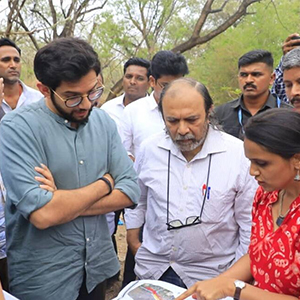
After transportation and solid waste management, the third point is decarbonising energy. If we work on all these points in future, then this will bring a big change in Pune city. The fourth point is beautification and cleanliness. The people here know more about riverfront development than me. The people must continue to fight for Vetal tekdi and stopping riverfront development, and I am with you. I do not want to stop development nor do you.
It is necessary to think whether we want to widen or deepen or concretise the riverbed if we want to restore the river to its original status by spending huge amounts of money. If we work for all these points, then there is no need to make a smarter Pune. If we hear the views of Puneites and implement it, then we would have achieved a lot. I will say this not only for Pune but also for Thane, Navi Mumbai, Kolhapur, Solapur and Mumbai because we know that the local residents are thinking of themselves when we hear their views.
If you are constructing a flyover near my home or bringing a bull dozer to do something, then I would definitely oppose it. There is a need to have a dialogue and communication between the people and the government. One must hear what the government wants to do transparently? This is known as democracy. Many a times we forget that democracy is representation governance and not we governing on you.
Now, there are no elected public representatives in municipal corporations and councils in the state so the current regime has an ideology that they are making a favour to us by ruling over us.
Development or destruction
Being a 32-year-old local citizen, it is very necessary to think about how will be the future of 50 years. I know that there is industry in Pune and it needs to be expanded. During the tenure of our government, we were trying to bring Vedanta Foxconn and other industries here. Airport is a necessity. Connectivity, roads and traffic planning are a necessity for Pune. If we do it after a genuine study and for sustainable development in which we can go for work in the morning where there are industries, by good PMPML bus or electric bus or metro or any mode of transport accepted by Puneites. There is an open ground or park when I return home. Grandparents, middle aged, children get freedom to do jogging or play cricket or conduct other activities in the open. This is life.
Underpasses/tunnels and flyovers are being built as there is technology and engineering available for it. There is a need for thinking about why we are doing it. Whether we want to make our Pune like Joshimath, a town in Uttaranchal which is sinking due to unplanned development, or conserve the old green Pune. If we think about it then everyone will get the answer. No one of us wants to stop the development, all of us want development but it must be for humans, for us and the surrounding environment. Then and only then it is development. If this development will lead to Joshimath like situation then it is not development, it is called destruction.
Good old Pune
Education is the only lever that gives children a chance to move ahead in life. For me the three critical areas of development are safety, preserving our environment and education.
-Anu Aga,
leading senior corporate leader and former chairperson of Thermax
I was born and brought up in Mumbai but over 50 years ago, my family moved to Pune because our business needed to expand and we could not afford to buy land in Mumbai. Many friends said that I would find it difficult to like and to adjust to Pune. But, I preferred living in Pune where housing was relatively affordable, good schools were relatively easy to get into and I enjoyed the people and their hospitality. When we moved to Pune, it was a beautiful city with a lot of greenery and variable climate.
Present Pune
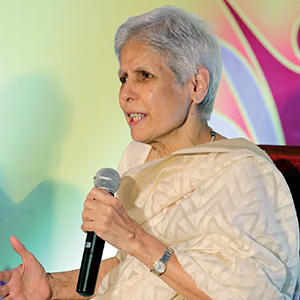
Fast forward to today’s Pune, with IT and auto ancillary industry moving in, creating massive job opportunities and therefore a need for development and high rise buildings. But what is sad, is that the development is not planned—construction has taken place haphazardly without any consideration for basic necessities like electricity, water supply, traffic, waste management, sewage, parking etc.
Safety: I will talk about three issues that are very dear to me. My first concern is safety. Pune compared to many other large cities is relatively a safe place to stay, live and I have driven back home at 11pm without any fear. Having said that, Pune has the dubious distinction of having the largest number of fatal road accidents. In a city where citizens cycle and use two wheelers, if there is an accident then chances of fatality are very high. In the olden days, my own children cycled to the tuition. But today, I doubt if most parents feel it safe.
The traffic in Pune is chaotic with no discipline to follow traffic rules. Very often vehicles jump red light signals. Speed limits are not adhered to. Helmets though compulsory are seldom worn, causing very fatal accidents. I would like Pune roads to be safe for pedestrians and have good cycle tracks, which encourage citizens to cycle to school, college or work. This would bring down pollution and congestion on roads. I would also expect the traffic police to enforce traffic rules very rigorously combined with patrolling.
Environment Preservation: The second concern is to preserve our environment. Earlier Pune had many houses without fans and air-conditioners, and in a few cantonment houses there were fireplaces. Can you imagine, they were using it? Pune was a green city with many trees and the climate was pleasant throughout the year. It was a famous retiring place for the elderly. Our pride and lifeline of Pune, Mula and Mutha were flowing rivers, with boating and fishermen catching fish. Today it is dirty, stinking and almost stagnant pool of water or should I call sewage except perhaps in the monsoons. With hyacinth that breed malaria and dengue, growing on the banks of the river. Raw sewage and industrial effluents is discharged directly into the river because the sewage and effluent treatment plants are highly inadequate and the ones installed are not working. What our city desperately needs is to clean up the rivers, as our highest priority. And, not releasing even a single drop of untreated sewage and industrial waste and ensure there is no hyacinth.
The Japanese government has offered us a loan to clean up our river under Japan International Cooperation Agency(JICA), but what did Pune Municipal Corporation(PMC) decide as their priority—instead of cleaning the rivers they have decide to beautify the river and narrowing the width by constructing concrete embankments. Pune already is a flood prone city. By narrowing the width, it could be disastrous and we could end up having terrible floods in future. We should not forget that The Energy and Resources Institute(TERI) has predicted 37.5 percent rise in rainfall in Pune with lesser rainy days and more frequent cloudbursts.
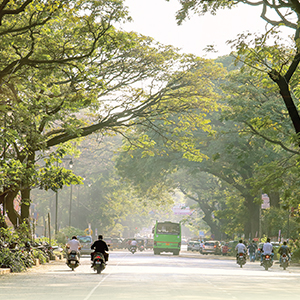
Thousands of trees will be cut for the beautification project and in spite of protests from environmentalists, non-governmental organisations (NGOs) and concerned people, the riverfront development project is going on at full speed. For the safety of our citizens and environment sustainability, I hope the voice of sanity prevails and the riverfront development project is stopped. There is a proposal to have road construction on our tekdi (a city hill) and tunnels below it. These tekdis are the lungs of Pune and a place where the average citizen can go for a nature walk. It also attracts all kinds of flora and fauna, and rare bird species. Thanks to the protests by citizens over the years, most of the tekdi is untouched. But every few years, there is a plan for so called development at the cost of irreversible environmental damage.
Education: My third concern is education. Moving onto education, Pune is known as ‘Oxford of the East’ for its old institutions like Deccan College, Gokhale Institute, College Of Engineering, Pune(COEP) and recently Symbiosis. But basic quality education for the poor is missing in our government schools.
Dream of my Pune of the future
Pune has the unique distinction of being very collaborative today, with concerned citizens always willing to come together to solve the problems of the city. For example, PPCR (Pune Platform for Covid-19 Response) was formed to provide hospitals with PPE kits, masks and oxygen cylinders. Also many years ago, when Pune had an extreme shortage of electricity, corporates came together under the aegis of CII and started generating their own power.
Indore was fortunate to have a very dynamic commissioner to clean up the city. But what’s wonderful is that the citizens continued to take pride to keep the city clean even after the commissioner was transferred and today it is the cleanest city in the country. I hope and dream that Pune and Puneites will not wait for a dynamic commissioner to clean up the city.
Our cities are never planned for the poor and they are forced to live in slums. My hope is that we start planning our cities a lot better including housing for the poor.
With regard to education, Akanksha which runs 11 schools in Pune with public-private partnership agreement with the Municipal Corporation and Central Government. With excellent value based education and extra-curricular activities such as sports and music, our kids are doing extremely well and have been admitted to well- known Indian and US universities. Can we have many more PPPs wherein the government partners with good, credible NGOs giving some amount to per child for education.
Education is the only lever that gives children a chance to move ahead in life. For me the three critical areas of development are safety, preserving our environment and education.